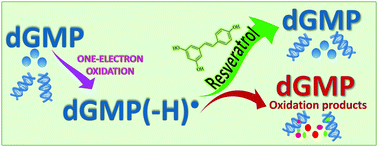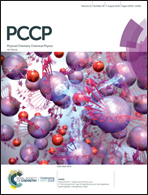Evidence of the effectiveness of Resveratrol in the prevention of guanine one-electron oxidation: possible benefits in cancer prevention†
Abstract
Over the past few years, the interest in Resveratrol (3,4′,5,-trihydroxystilbene, RSV) has increased due to the evidence found of its antioxidant action that protects biomolecules and cells from oxidative damage. The interest has been further exacerbated by the natural presence of RSV in some fruits and derivatives, especially in red wine. In this paper we present evidence of RSV capacity in protecting a deoxynucleotide, an essential constituent of DNA, from one-electron oxidation. This article evaluates the mechanism responsible for the antioxidant action of RSV, after one-electron oxidation of 2′-deoxyguanosine 5′-monophosphate (dGMP), by kinetic analysis during steady-state irradiation and laser flash photolysis experiments. Results showed that RSV protects dGMP by recovering the nucleotide from its radical, which is formed after the reaction of dGMP with the triplet excited state of the photosensitizer. In the absence of RSV, dGMP is irremediably oxidized, and if the damage occurs in dGMP located in DNA molecules, the consequences can be as serious as mutations and subsequent carcinogenic lesions.



 Please wait while we load your content...
Please wait while we load your content...